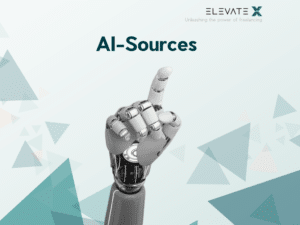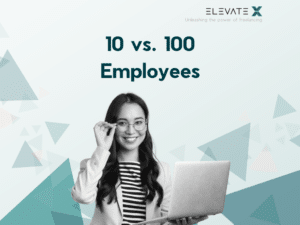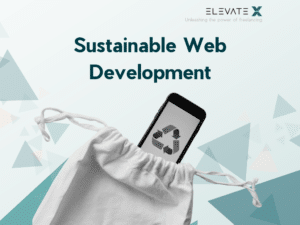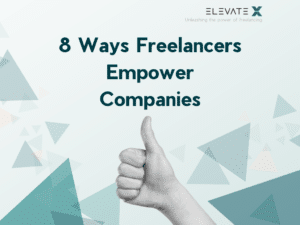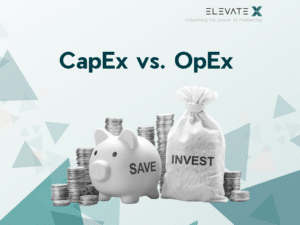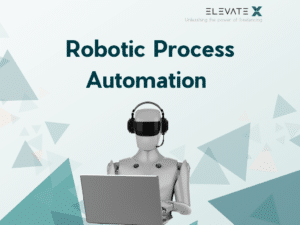The world of work is changing. Change and transformation are everywhere. In addition, many organisations are experiencing skills shortages and potential candidates are setting new priorities for future employers. Issues such as employer branding, recruitment, sustainability and benefits are having a significant impact on job seekers’ decisions, both positively and negatively.
Key point, employer branding: It’s not enough to be a top employer brand, it has to be an experience that candidates and job seekers can feel at all times. More than ever, recruiters need sustainable strategies and compelling arguments to attract potential candidates to join their organisation. The previously neglected candidate journey is increasingly coming into focus. And with good reason!
What Exactly is a Candidate Journey?
The Candidate Journey is the path taken by job seekers or potential candidates who apply for a job with an organisation. It is the candidate’s journey through the entire application process. It starts with the general search for suitable positions and employers, continues through the decision-making process and a possible interview, and culminates in the eventual hiring. But it doesn’t end there: the onboarding phase is also part of the candidate journey.
KEY POINTS
- Candidate Journey encompasses the entire application process, from the initial job search to onboarding in the company.
- Employer Branding is crucial to positively influence candidates in all phases of the Candidate Journey.
- A positive Candidate Experience requires a simple, fast, and mobile-optimized application process.
The Six Phases of a Candidate Journey
The candidate journey is a process with multiple touchpoints, divided into different phases. We’ll tell you what these stages are and how you can ensure a positive candidate experience at each stage.
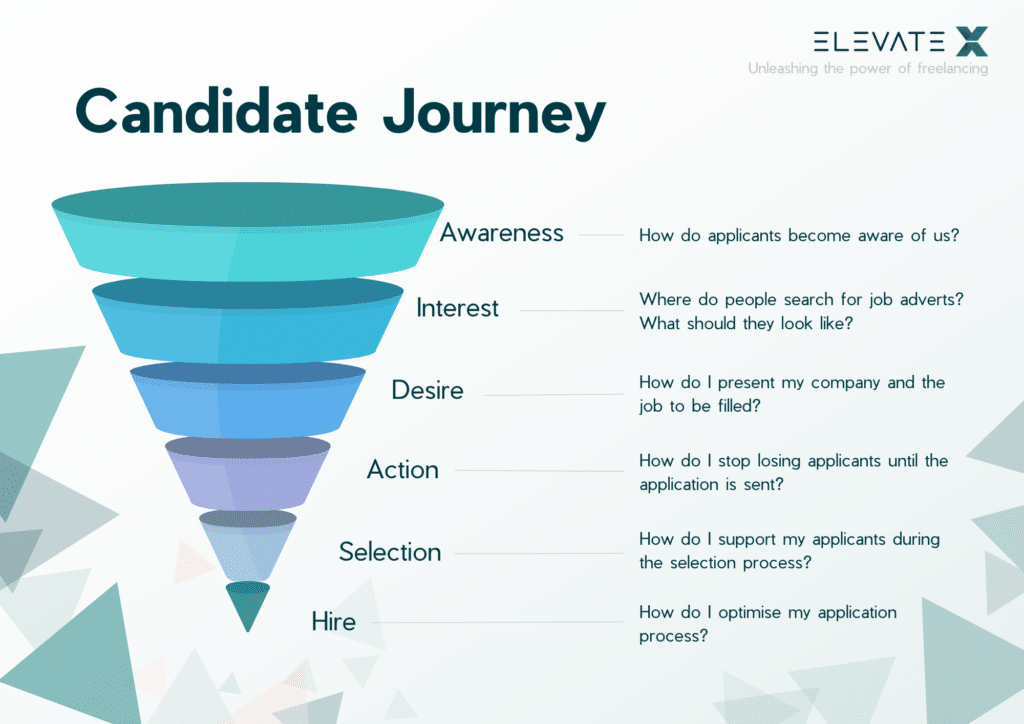
Phase 1 - Awareness
The candidate’s journey begins with the awareness phase. In other words, candidates discover the company during this phase. This only works if a company is present and easy to find. In addition to a corporate website, you should be active on job portals, industry-related platforms and social media.
It’s important that users get all the relevant information about your company. To optimise visibility and findability, the use of relevant keywords is highly recommended. This will ensure that your company appears in the top search results.
Phase 2 - Interest
The candidate is now aware of your company and ideally curious. They now enter the consideration phase. This means the candidate is now deciding which company to choose. In this phase, a coherent employer branding is particularly important.
This also includes providing a good overview of the company culture and values. Combined with high-quality texts, a detailed job description, and additional information about the workday, you create a well-rounded overall package. But don’t go overboard. Exaggerated job profiles can be counterproductive and deter candidates.
By the way: Posts from your own employees praising your employer brand are particularly positive. Platforms like Kununu and Glassdoor are especially suitable for this. Remember to make all pages appealing and optimize for mobile devices, as expected from a good employer brand.
We Improve Your Candidate Journey!
Phase 3 - Desire
There is a lot of overlap between phases 2 and 3, so the boundaries are often blurred. A well-written job advertisement in phase 2 acts as a gateway to phase 3. Your job in phase 3 is to make the candidate want to work for your company. Two attributes play a crucial role here: authenticity and unique selling points.
You need to convey credibility, security, reliability and authenticity. In addition, after reviewing the information, candidates must be able to see what makes your company unique and how it stands out from the competition. It’s imperative that all your online presences are in tune with each other and always convey what a great place to work you are.
But don’t rely on online recruitment alone. Recruiters can also subtly encourage callers to apply to your company during telephone enquiries. It’s often well received if you offer to help the caller further along their candidate journey.
Phase 4 - Application / Action
This phase is particularly important for the candidate journey. At this point, the respective candidate submits their application to you. However, to prevent them from reconsidering their application at the last minute, you can make some preparations. The following points are of particular importance:
- Quick and easy contact initiation.
- A clearly defined point of contact.
- A career page or job listing optimized for mobile devices.
- A streamlined application process.
- Uncomplicated application forms.
- Requesting only truly relevant documents.
Especially important are the optimization for mobile devices and a streamlined application process. Most applicants complete the application scenario using their smartphone or tablet. Additionally, according to various studies, one in five applicants will abandon their job search if the process is too complex.
Phase 5 - Selection
This is probably the most labour intensive stage for companies. At this stage, candidates are comparing the employers on their shortlist. Naturally, they want as much information as possible about the companies. You can score points by using an interview as an opportunity to get to know each other and answer any questions the candidate may have. But be careful: Do not raise false expectations.
Also, this approach positively impacts the candidate journey:
- Always address the acknowledgment of receipt personally.
- Write sensitively worded and justified rejections.
- Inform candidates about prolonged decision-making processes.
- Personally invite to interviews via telephone.
- Offer a friendly and open atmosphere during the interview.
- Structure the interview well.
- Make a decision as quickly as possible after the interview.
- Avoid pressuring candidates regarding the signing of the employment contract.
Phase 6 - Hire / Onboarding
The candidate journey concludes with the hiring and integration into the company. Here, too, it’s important to set positive signs. The onboarding process must be well-prepared, as 28 percent of all new hires submit their resignation within the first 90 days!
This means that even after hiring, the candidate journey continues. Negative experiences can still lead to a change of heart. Your task is to introduce new hires to the company’s culture and philosophy, familiarize them with current and future tasks and processes, and establish initial contact with colleagues.
It is helpful to sensitize your own departments to new employees in advance. This eases the onboarding and coaching of new employees. You can also promote integration into the team and connection to the company on a personal level. A warm welcome can work wonders here.
How Can Freelancers Help Improve the Candidate Journey?
Recruiting and hiring good candidates is relatively difficult given the competitive situation and the individual demands of the candidates, especially if you don’t pay enough attention to recruiting or lack the necessary recruiting competence in your own company. Examples of mistakes include:
- Not addressing individuals personally.
- Poor preparation for conversations and candidates.
- Luring with money, but not promoting the company’s vision.
- Poor interviewers.
- Delayed feedback.
- No support during the application process.
How You Benefit from a Freelancer
Freelancers, with the necessary know-how, years of expertise, and empathy, can be of decisive help here. They engage intensively with the candidates beforehand, are well-prepared for conversations, and respond specifically to each applicant. This consistently populates the candidate journey with positive experiences and ensures a good candidate experience.
This term represents the journey of an applicant through the entire application process. It encompasses a total of six phases. The journey always starts with the non-binding search for a suitable position and a good employer.
The candidate journey is divided into these six phases:
- Awareness Phase
- Consideration Phase
- Desire Phase
- Application / Action Phase
- Selection Phase
- Hire / Onboarding Phase
Freelancers specialized in recruiting have precisely the competence and experience needed to filter out the best candidates and convince them of your company. Most importantly, they prepare individually for each candidate and adopt the applicant’s perspective. This helps them understand what candidates expect and what needs they have.



